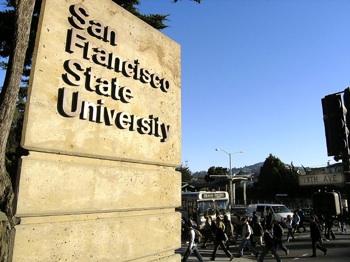December 2nd – 4th 2011
San Francisco State University
Call For Papers
21st Century Production: Technology, Performance & the Workspace
The conference panel invites proposals for papers on the following themes:
Performing in the Studio:
Evan Eisenberg described the paradox of recording as being “that [for the performer] the audience is not there…[is] the flip side of the fact that, for the listener, the performer is not there”. How does this affect the relationship between the performer or listener and the music? This stream invites papers on all aspects, both theoretical and practical, of this subject including:
- The affect of architecture, isolation and monitoring technology on performance (and recording)
- ‘Virtual’ performances (production and reception approaches)
- Motivation and inspiration in the studio
- Non-linear performance and editing (collaborative performance, agency and mediation)
- Hearing and interpreting mediated performances (conceptual blending, staging and authenticity)
- The social dynamics and power relationships of the studio environment
- Real and unreal performances
- Performing to clicks, backing tracks and moving images.
The Contemporary Recording Studio:
The stereotypical story of recording studios in the 21st century is that the traditional, expensive recording studio model has given way to a cheap desktop system. Is this actually the case? What is the more sophisticated and nuanced version of this story? The stream invites papers on all aspects, both theoretical and practical, of this subject including:
- Changing business models for recording studios
- The studio as a place of work (representing and mythologising the studio)
- The rise of the semi-pro / bedroom market (recording as leisure consumption rather than music production)
- Studies about specific studios, historical periods, geographical areas, architectural or design types
- Relationships between people and studios
- The effect of television, film, game design and other media on recording studios
- The computer as a place of work
- Working practice and how studio design and usage has altered it.
Hardware versus Software:
From the 1980s onwards the march of the computer into music production and recording has been inexorable and has completely changed the nature of recording, editing, processing and mixing. From the aural Lego of AppleLoops in the consumer market to DIY signal processing system design and electronic composition with Max/MSP, the landscape of recorded music has changed beyond recognition in thirty years. The stream invites papers on all aspects, both theoretical and practical, of this subject including:
- Analogue versus digital (processing, storage and amplification)
- The effect on music to picture
- The change of creative focus from recording to processing
- Agency and ownership in musical creativity (did the guy at Garageband co-write my tune?)
- Mixing in and out of ‘the box’
- Ergonomics and the Human Computer Interface
- Changes in the way we visualise and conceptualise sound
- Presets, plug-ins and the lure of new toys.
Teaching Production:
The huge expansion, at universities and elsewhere, in courses about music technology, production and sound engineering has coincided with a contraction in the job market and income streams in the sector. At the same time, more and more magazines, books and websites are putting the ‘secrets’ of the profession in the public domain and the product designers are doing their best to simplify the process for their users. The stream invites papers on all aspects, both theoretical and practical, of this subject including:
- How can educators best prepare audio students for the job market?
- Art or Science? Should courses be contextualising audio studies with cultural theory or electrical engineering?
- What can universities teach students that a website can’t?
- The pros and cons of generalised courses as opposed to specialisms such as live sound, sound for film, television and other media etc.
- Who should be teaching audio? Professional and academic backgrounds.
- Where are the jobs, income streams and growth opportunities in the current market?
- What’s the future of education in this sector?
The conference panel would like to invite delegates to submit ideas for presentations exploring aspects of music production, performances and practical demonstrations on any topic relating to the Art of Record Production.
We welcome work from any relevant academic perspective, including but not limited to popular music studies, ethnomusicology, the study of performance practice, communication studies, historical musicology, the history of technology, ergonomics, acoustics and psychoacoustics, music theory, music cognition, music and music technology education, and the philosophies of music, mediation and technology. Please include a note on methodology where appropriate, and an indication of the theme your work is intending to address.
Papers or demonstrations that require recording / studio / 5.1 playback facilities are also encouraged but selection will be subject to a feasibility study by the conference panel at San Francisco State University.
Proposals for individual papers and poster presentations should not exceed 500 words and should be in Word Document, Rich Text File or Text file formats (doc, docx, rtf or txt files).
Submissions by email to simonzt@artofrecordproduction.com
The deadline for proposals is 15th May 2011
Katia Isakoff, Director of the Art of Record Production Conference
Scott Patterson, Host of the 7th Art of Record Production Conference
Steve Savage, Host of the 7th Art of Record Production Conference
Simon Zagorski-Thomas, Director of the Art of Record Production Conference

